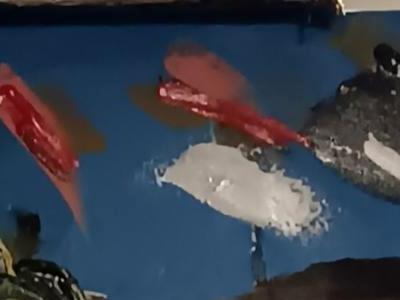As long as I have considered myself an artist of some sort - poet, playwright, painter - I have suffered from a little bit of mental illness. Dysthymia likely mixed with general anxiety disorder seems to be the diagnosis. I've had my ups and downs and tossed around the notion of suicide and self-destruction. And I grew up with and embraced the idea of the suffering artist. But over the past year, I have also struggled with the notion of the suffering artist and whether I have potential as a great artist if I am not suffering.
There are two books to refer you to. The first is Kay Redfield Jamison's "Touched With Fire" (1993), which provides a strong case for the link between creativity and the bipolar condition (or manic-depressiveness). Byron was one of the key artists in her book. The second is "Catching The Big Fish: Meditation, Consciousness, And Creativity" (2006) by filmmaker David Lynch.
Redfield's book was informative and insightful. Lynch's book was illuminating. And reading the chapter on suffering, he posits that the artist will in fact be more creative if he is not suffering, that suffering distracts from the ability of the artist to create. He refers to Vincent van Gogh, who, Lynch believes, "would have been even more prolific and even greater if he wasn't so restricted by the things tormenting him." (Lynch, p. 94) He goes on to opine that it was painting that gave van Gogh what little happiness he had.
Now, after contemplating this and thinking of how I felt when I created, I have to concur. When I was feeling down...really down, not just in a mood...I didn't want to create. I wanted to sit and brood and contemplate unthinkable things. When I found the energy to pick up a brush, I was almost euphoric, as though a spirit was moving within me to get me to create. I felt energized, liberated, transcendent. The dysthymia is still there, but making art helps me overcome it.
Mr. Lynch goes on to discuss how meditation can help an artist by focusing his energy, digging deeper into his consciousness, seeking out the big fish of ideas. He promotes Transcendental Meditation. I do not, not specifically. But I do lean toward mindfulness. And after reading Lynch's book, I've read "The Upanishads", am reading "The Bhagavad-Gita", re-read "The Razor's Edge," and most recently read "The Miracle of Mindfulness" and "The Zen of Creativity" to influence and inspire me and find ways to discipline myself to be more focused.
My own personal advice to artists: if you are depressed, anxious, sad, whatever, seek help. Don't let it fester. It can kill you. Once you are out of crisis or on the mend, find regular routines in life that you can use - meditation, deep breathing, mindfulness, prayer, reading, exercise - that keeps you focused and helps offer you clarity. I use some meditation (and want to learn more), walk (a favorite activity), read, and got rid of alcohol as a regular part of my life. Depressions still happen. Anxiety still festers. But I am seeking the transcendence and lucidity I need to paint, to make my art.
